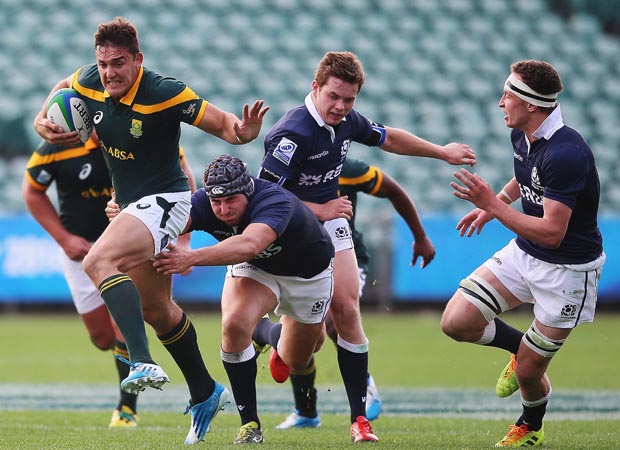 As Vern Cotter comes to terms with the enormity of the task facing him and his management team in having to turn Scotland around from the downward spiral that has slowly seen them become a shadow of the great side they once were, the reality of the cost of professional rugby at international level is slowly beginning to bite.
As Vern Cotter comes to terms with the enormity of the task facing him and his management team in having to turn Scotland around from the downward spiral that has slowly seen them become a shadow of the great side they once were, the reality of the cost of professional rugby at international level is slowly beginning to bite.
Even though the 55-6 thrashing by South Africa came at the end of what, on paper, had been a successful tour with wins against USA, Canada and Argentina, our Celtic cousins cannot be pleased with wins against what are, basically, second tier teams.
Although Argentina have now reached the dizzy heights of the Rugby Championship, they are about the same level as Italy were when they joined the Five Nations, while Canada and America are a long way off the standard that a team like Scotland aspire to play, even on an ‘off’ day.
Even though Scotland are still producing some great players, they just don’t have either the financial muscle or player numbers to be able continually to play at the top of the game without help.
Cotter has got to sound positive as a new coach but he must know that it is going to be an uphill struggle to keep Scotland competitive with the rest of the Six Nations, let alone the SANZAR countries and that has got to be a worry for all in the Northern Hemisphere.
The addition of Italy to the Five Nations was merited because Italy had raised the standard of their game and have been able to improve their competitiveness year on year – but instead of an improving contest we have a virtually two-tier Six Nations, with Scotland and Italy remaining the bottom two teams since 2006.
As I wrote last week, the results this summer are about the level of competition that the players face and although internationals are not weekly events, the standard of opposition at that level also plays a part.
Falling standards in the Six Nations could seriously impact on the ability of our teams to compete in World Cups and this reinforces the need for both the summer tours and autumn internationals to help our teams remain competitive.
Any decline could also impact on the finances of the Unions if television decides there should be a change in priority and pay more for the autumn matches than the Six Nations.
It’s not just Scotland; France have had a dramatic fall from grace, but because of sheer number of players they are still able to field more competitive sides.
France traditionally had fared better against the SANZAR nations than any of the Home Unions but that, too, has changed since the dawn of professionalism.
The club game in France is financially far bigger than its cousin on this side of the Channel, with collective revenues that far outstrip the French Federation’s.
Although rubbished by Toulon owner Mourad Boudjellal, Phillipe Saint-Andre’s assertion that the number of foreign players in the Top14 has damaged the French national side’s prospects, may have a grain of truth in it.
With a total of 220 registered foreign players available in the Top 14, it is theoretically possible for all seven matches on a weekend to be played without a single Frenchman taking the field.
Admittedly, the foreign players are not evenly distributed throughout the league, but a large number do play in vital positions such as front row or half-backs, making it difficult for Saint-Andre or any other coach to pick from a position of strength of numbers.
The French Federation, unlike the RFU, do not generate enough money to be able to pay their clubs to ensure a certain number of French qualified players in match-day squads, but all that will change when the new FFR-owned stadium is completed in a few years.
That should resurrect the French game at the international level and may also help strengthen the French contingent within the Top 14, but unfortunately Scotland have no magic bullet that can drastically revive their fortunes.
If the gap in playing standards continues to grow in the Six Nations, it could be that a two-tier international European competition becomes a reality and if it does, then that would increase the likelihood of what Saracens chairman Nigel Wray has prophesied, South Africa wanting to change allegiance from the Rugby Championship to a new European tournament.
There is a certain logic to South Africa playing in our international competition, as they are on the same timeline and would therefore make an ideal partner, as games could kick-off at a time that would suit all the participating nations.
There is no doubt that it could also dramatically increase possible TV revenues for all but – and it is a big but – would it be good for the game?
It would be good for England, Ireland, Wales and France, though it would be likely to further disadvantage Scotland and Italy.
It could also damage the game in New Zealand, Argentina and particularly Australia, where the ARU are balancing on the edge of a financial precipice.
I understand why Wray sees the potential of the Boks coming north and the possibility that it would open the door for the whole of the South African game by playing in Europe, thereby enabling the games that Saracens want between their club and the SA regions.
Despite the logic, I cannot see the IRB ever agreeing to such a move until there were alternative nations able to fill the void that such a change would leave, both in competition and finance across the world game.
*This article was published in The Rugby Paper on July 6
























Pingback: Winchester Defender Ammunition 12 Gauge 2-3/4" 1-1/8 oz 2 Plated Shot For Sale Online